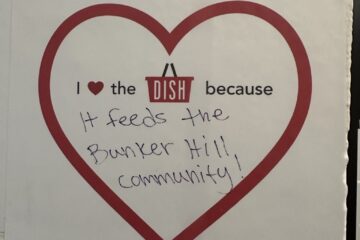Written by Stefano Mancini, Bill Emerson National Hunger Fellow with The Greater Boston Food Bank.
When you think of Cape Cod, beautiful beaches, seafood, and whale watching might come to mind. Cape Cod is a major international tourist destination during the summertime, yet the local economy faces challenges during the winter months especially. In 2023, The Greater Boston Food Bank (GBFB) distributed nearly 4 million meals to its agency partners on the Cape who experience great need year-round, including the pantry at Cape Cod Community College (CCCC), a satellite site of the Family Pantry of Cape Cod (GBFB’s partner).
With enrollment at the state’s community colleges increasing thanks to recent efforts to boost college enrollment with MassReconnect and other programs, many campuses are struggling to meet students’ basic needs and support them on their pathway to graduation. For some students returning to higher ed later in life, affording healthy food is a challenge when juggling employment and family responsibilities with studying.
That’s where the Massachusetts Hunger Free Campus Initiative comes in. The Initiative allows community colleges and public universities in MA to apply for funds to create impactful hunger-relief programs on campus. CCCC is one of 30 public and minority-serving institutions of higher education in Massachusetts that received funds from the legislature in 2022 through the Hunger Free Campus Initiative. The college used these funds to purchase meal vouchers for students to eat at the school’s cafeteria among their peers, so students from all backgrounds can bond, study, learn, and relax over a warm meal in a communal space. The college also hopes to use funds to continue to expand their pantry and increase access to fresh produce, meat, and dairy.
Cheryl Kramer, Student Wellness Case Manager at CCCC and member of the MA Hunger Free Campus Coalition, provides students with meal vouchers and connects them with a suite of comprehensive wraparound services. “If that lightens the student’s load, helps her finish her education, that’s what we’re here for,” says Kramer.
The Massachusetts Hunger-Free Campus Coalition, founded in 2019 and led by The Greater Boston Food Bank, the Food Bank of Western Massachusetts, and the Massachusetts Law Reform Institute, works to advance the Hunger Free Campus Initiative through legislative and budget campaigns to permanently establish and fund it. Currently, the HFCC is advocating for $2 million in the FY25 state budget for the Initiative (building upon $1M secured in the FY24 budget and $3.7M through ARPA funding), and to pass an Act establishing the Hunger Free Campus Initiative (S835 / H1293). The legislation is sponsored by Representative Andy Vargas (D-Haverhill) and Senator Joan Lovely (D-Salem).
It is critical that Massachusetts supports basic needs for the growing number of public and community college students who make up our future workforce. The example of CCCC makes it clear – when even one student can make the most of their education thanks to the Hunger–Free Campus Initiative, everyone in the Commonwealth wins.
